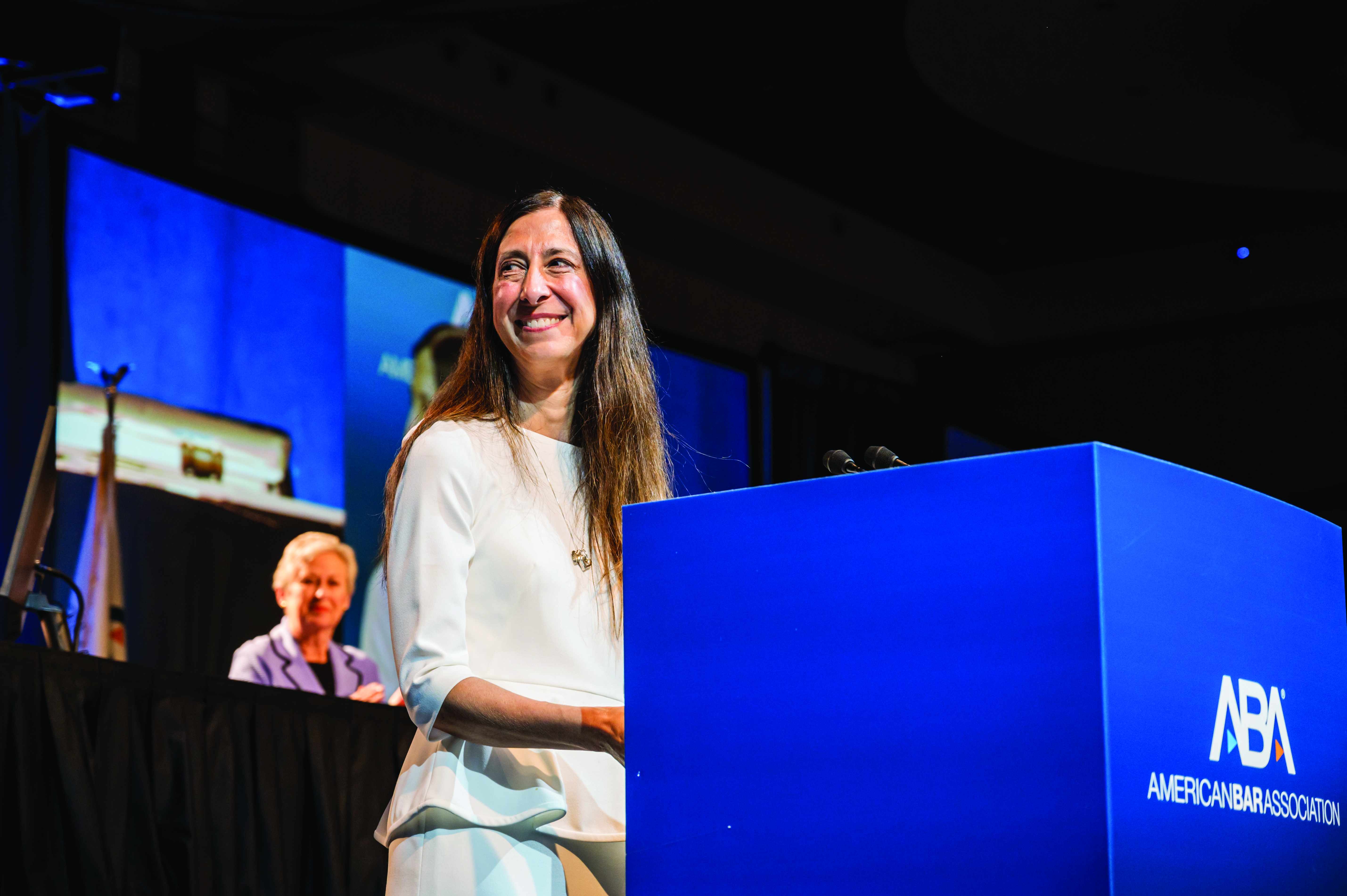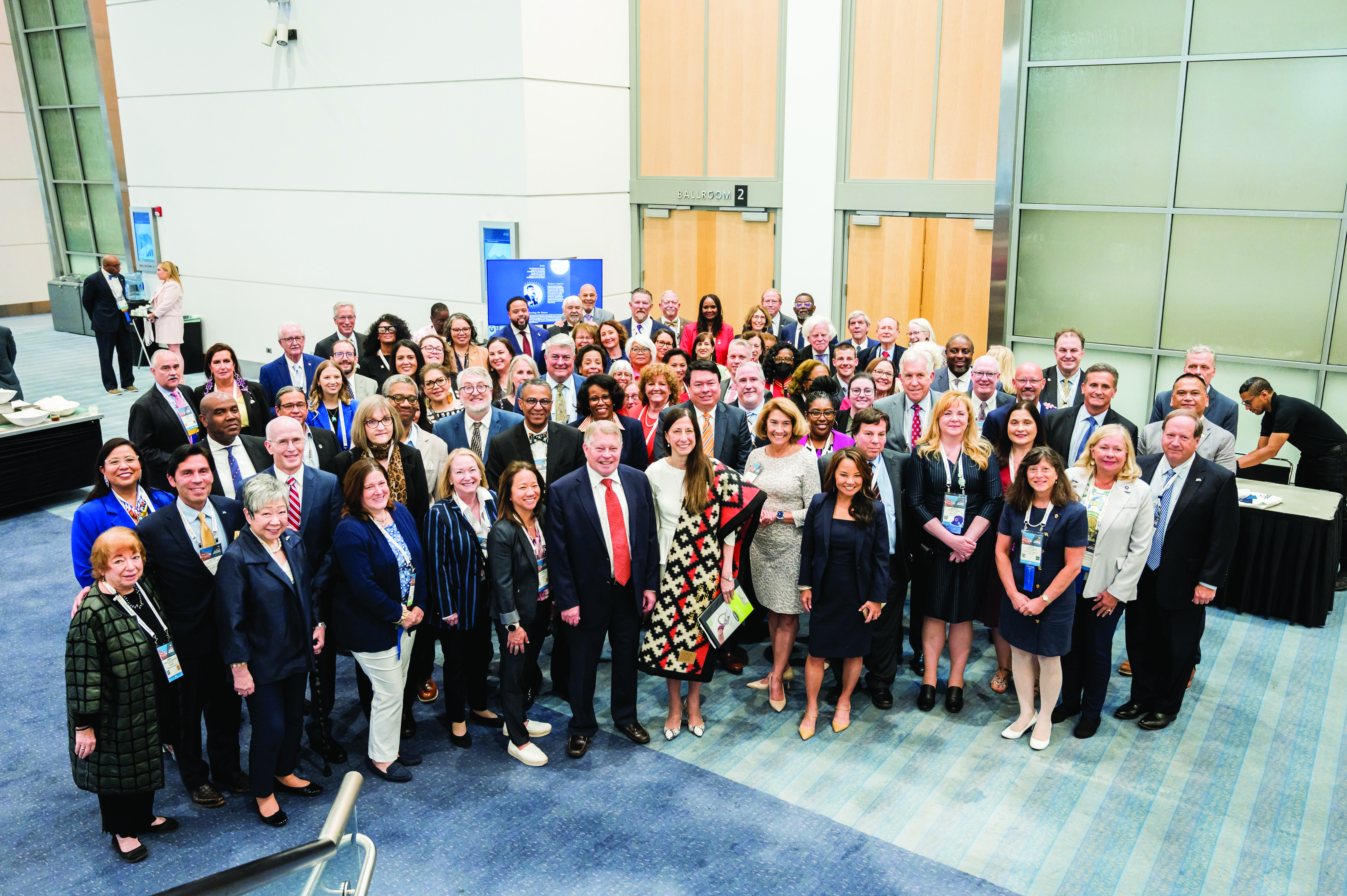Supporting democracy, exploring AI and highlighting member experiences are ABA President Mary Smith's priorities

ABA President Mary Smith delivers remarks at the 2023 ABA Annual Meeting. Photo by Elevate Photography/ABA Journal.
Mary Smith wants ABA members to know: It’s a critical time to be part of the association.
Smith, an enrolled member of the Cherokee Nation, in August became the first Native American woman to serve as president of the ABA. During her speech to the House of Delegates at the annual meeting, she stressed that democracy faces serious challenges and called on members “to run toward the storm.”
She joined the ABA in law school but says she grew more involved two decades ago to help promote the rule of law and civil rights. She has since served the ABA in many ways, including as ABA secretary from 2017-2020 and as a member of the Board of Governors for seven years. She has been active in the Commission on Women in the Profession, the Section of Litigation and the Section of Civil Rights and Social Justice.
Smith, vice chair at the VENG Group in Chicago, recently spoke with the ABA Journal about her experiences and plans for the association. The conversation, which has been edited for clarity and length, appears below.
So it’s been a little more than a month since you became president. What’s it been like so far?
It’s been very humbling. I have even more fully realized the depth and breadth of the American Bar Association and the reach it has in the United States and around the world.
I’ve traveled to meet law students and members of the legal community. In fact, my first trip as president was to Tulsa, where I visited Greenwood, “Black Wall Street,” which was the site of a 1921 race massacre. During that trip, I met with descendants of survivors. I was also welcomed by the University of Tulsa law school and by Principal Chief Chuck Hoskin Jr. of the Cherokee Nation.
In the short time I’ve been president, our Young Lawyers Division also has been mobilizing to help with the Maui fires. And finally, our Board of Governors has voted to embark on a strategic planning process for the association, which will chart a new future for the ABA.
When you spoke to the House, you emphasized the need to face challenges to democracy. How do you plan to help members do that?
Since the annual meeting, I have announced the creation of the ABA Task Force for American Democracy to look at ways to improve public trust in our election system. This task force is co-chaired by former Judge J. Michael Luttig and former Secretary of Homeland Security Jeh Johnson. The members of the task force include thought leaders, lawyers, former elected officials, business [leaders], among others who represent—and this is very important—a bipartisan group of recognized national leaders with expertise in American government, democracy and the rule of law.
They’re going to be looking at three areas. One, depoliticizing the administration of elections. Two, educating the public on the principles of our democracy and driving ownership of those principles into the American culture. And three, identifying and advancing improvements and innovations in our systems of elections that will address the root causes of the current politicization and lack of trust in our elections and in our democracy.
They are going to host listening tours around the country and have public conversations—as well as one-on-one and smaller discussions—with a broad spectrum of Americans to hear their concerns, experiences and suggestions for restoring and preserving democracy.
Why do you think it is important for lawyers to support and defend democracy?
Lawyers are essentially the keepers of democracy. Lawyers are entrusted by the public with a fiduciary duty to uphold and promote the Constitution, democracy and rule of law principles. We have a duty to educate the public on the framework of governance that holds our country together, as the Constitution begins, “We the people.” The political practice provides for the people to vote on important issues through the election of their representatives. And when ill-informed or autocratic voices seek to ignore or violate our constitutional processes, lawyers have a duty to stand up and oppose such violations. Education is the best protection against misinformation or disinformation that confuses the public. So we’re seeking to keep politics out of the administration of elections and to strengthen civics education. We’re building upon the great work that President [Deborah] Enix-Ross started with her Cornerstones of Democracy initiative.
Another initiative you announced was the Task Force on Law and Artificial Intelligence. Why do you think this group is needed?
AI is transforming every industry sector, including the legal profession. AI presents both promise and peril. With every technological transformation, the legal profession addresses complex and challenging legal and ethical issues. The ABA has a long history of being at the forefront of not only the most important legal issues of our time but the most important issues of our time.
We’re taking a leadership role in looking at emerging applications of AI technology and assessing the impact of AI on the legal profession and the practice of law. We’re also assessing potential risks to lawyers and their clients. During the next year, we will have programming and policy discussions regarding the legal issues in AI.
Are there other initiatives you plan to focus on during your term?
As I mentioned, we are embarking on a strategic planning process for the association. I’m very excited about that process because it will help us set priorities and chart a new course for the future of this association. I’m very thankful to the Board of Governors for taking that step.
One of the things I have started is a Presidential Speaker Series. Law touches everything in society. We are promoting civility at the American Bar Association and having conversations with people who have different backgrounds, different career arcs, different jobs. The theme of my year is “Lifting Our Voices, Charting the Future,” and the speakers in the speaker series encapsulate that because they are lifting their voices and charting their future in a different way. One of the speakers was former U.S. ambassador to NATO Ivo Daalder. He spoke about world affairs. We also secured Dolores Huerta. She’s a legend in farmworkers’ rights.
Looking back, which of your past ABA experiences do you think will be most helpful to you?
One of the traits of a great leader is being able to build coalitions and help people coalesce around common goals. In my past experience in the American Bar Association, I’ve been able to do that. The ABA is a diverse coalition of people, and I’ve worked with various coalitions throughout my career. That’s why it was important for me to be active in the National Conference of Bar Presidents, to help state and local bars and to establish relationships so we can work together for the profession. I also was active in sections, divisions and forums, and that’s provided me insights on the priorities and needs of the ABA. And finally, I have served on the Board of Governors, and that helps me look at the ABA from a governance standpoint.
 Mary Smith’s induction was celebrated at the 2023 ABA Annual Meeting. Photo by Elevate Photography/ABA Journal.
Mary Smith’s induction was celebrated at the 2023 ABA Annual Meeting. Photo by Elevate Photography/ABA Journal.
In what ways would you like to see the association grow and evolve?
My answer emanates from the conversations I’ve had with our members and how they would like to see the association grow and evolve. What I’ve heard is as basic as the ABCs.
A, they want us to advocate for lawyers. Our members want to ensure the ABA is a strong voice for the legal profession.
B, build a bigger tent. The legal profession is as diverse as our country—and not just on racial and gender diversity. I’m going to work very collaboratively with the sections, divisions and forums and the staff to ensure the ABA is relevant for lawyers—whether they work at a big multinational firm in New York or in a rural community in South Dakota, Oklahoma or Kentucky, and whether they are at the beginning of their career, they’re in the midst of it or nearing retirement.
And C, communicate. The ABA does amazing work and has great programs. But many lawyers still, unfortunately, don’t know what we do and how we can help them. We need to communicate better. I’m going to work to raise the visibility of the ABA.
I am trying to imagine what is possible for the American Bar Association. My vision for the ABA is to make sure it is recognized as a must-join organization for lawyers.
It hasn’t been that long, but what are your favorite parts of being ABA president?
By far, it’s meeting our incredible members who are doing amazing work in their firms and in their ABA activities. I am enjoying meeting people in the community, particularly the young people, and hearing about their work and the joy they have about starting on their journey of being a lawyer.
I have just a couple more questions. First, personally, what does it mean to be the first Native American woman to serve in this role?
It means a lot to me. I recognize the significance of being the first Native American woman to serve as American Bar Association president. I know it means a lot for the Native American community but also, I think, the community beyond Native Americans. If my simply being in this role provides inspiration to young people and says to them, “If I want to be a lawyer, if I want to be president of ABA, I can do it,” that is very humbling to me and makes me happy.
And finally, maybe an even more personal question, what is something most people don’t know about you?
Well, I enjoy hearing people’s stories and learning about their lives. I think that’s why I liked being a trial lawyer. Because in one way, being a trial lawyer is being a storyteller. So I think if I weren’t a lawyer, I would probably be a journalist or a biographer.
This story was originally published in the December 2023-January 2024 issue of the ABA Journal under the headline: “Meet Mary Smith: Supporting democracy, exploring AI and highlighting member experiences are president’s priorities.”
Write a letter to the editor, share a story tip or update, or report an error.



